英语in on at off等介词的用法
- 格式:doc
- 大小:62.00 KB
- 文档页数:11
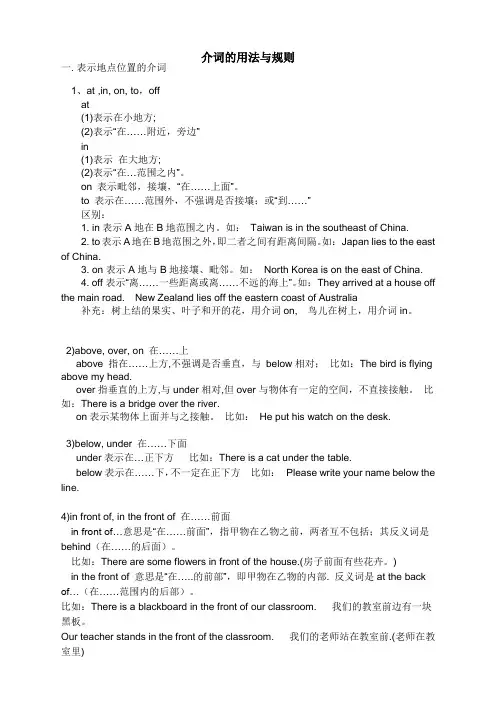
介词的用法与规则一. 表示地点位置的介词1、at ,in, on, to,offat(1)表示在小地方;(2)表示“在……附近,旁边”in(1)表示在大地方;(2)表示“在…范围之内”。
on 表示毗邻,接壤,“在……上面”。
to 表示在……范围外,不强调是否接壤;或“到……”区别:1. in表示A地在B地范围之内。
如:Taiwan is in the southeast of China.2. to表示A地在B地范围之外,即二者之间有距离间隔。
如:Japan lies to the east of China.3. on表示A地与B地接壤、毗邻。
如:North Korea is on the east of China.4. off表示“离……一些距离或离……不远的海上”。
如:They arrived at a house off the main road. New Zealand lies off the eastern coast of Australia补充:树上结的果实、叶子和开的花,用介词on, 鸟儿在树上,用介词in。
2)above, over, on 在……上above 指在……上方,不强调是否垂直,与below相对;比如:The bird is flying above my head.over指垂直的上方,与under相对,但over与物体有一定的空间,不直接接触。
比如:There is a bridge over the river.on表示某物体上面并与之接触。
比如:He put his watch on the desk.3)below, under 在……下面under表示在…正下方比如:There is a cat under the table.below表示在……下,不一定在正下方比如:Please write your name below the line.4)in front of, in the front of 在……前面in front of…意思是“在……前面”,指甲物在乙物之前,两者互不包括;其反义词是behind(在……的后面)。
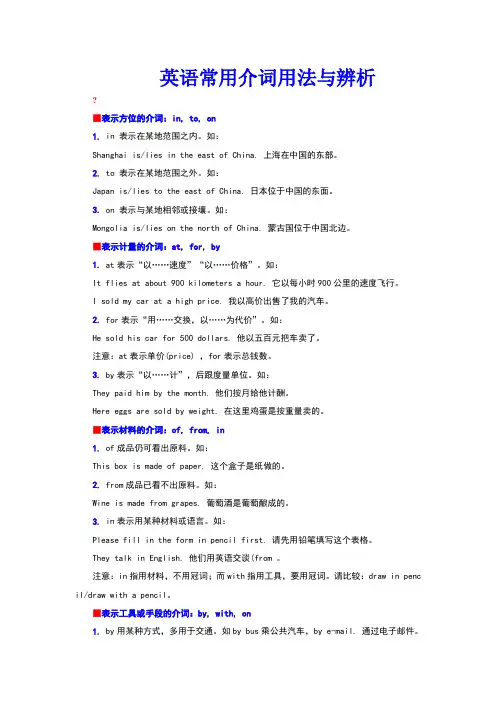
英语常用介词用法与辨析?■表示方位的介词:in, to, on1. in 表示在某地范围之内。
如:Shanghai is/lies in the east of China. 上海在中国的东部。
2. to 表示在某地范围之外。
如:Japan is/lies to the east of China. 日本位于中国的东面。
3. on 表示与某地相邻或接壤。
如:Mongolia is/lies on the north of China. 蒙古国位于中国北边。
■表示计量的介词:at, for, by1. at表示“以……速度”“以……价格”。
如:It flies at about 900 kilometers a hour. 它以每小时900公里的速度飞行。
I sold my car at a high price. 我以高价出售了我的汽车。
2. for表示“用……交换,以……为代价”。
如:He sold his car for 500 dollars. 他以五百元把车卖了。
注意:at表示单价(price) ,for表示总钱数。
3. by表示“以……计”,后跟度量单位。
如:They paid him by the month. 他们按月给他计酬。
Here eggs are sold by weight. 在这里鸡蛋是按重量卖的。
■表示材料的介词:of, from, in1. of成品仍可看出原料。
如:This box is made of paper. 这个盒子是纸做的。
2. from成品已看不出原料。
如:Wine is made from grapes. 葡萄酒是葡萄酿成的。
3. in表示用某种材料或语言。
如:Please fill in the form in pencil first. 请先用铅笔填写这个表格。
They talk in English. 他们用英语交谈(from 。
注意:in指用材料,不用冠词;而with指用工具,要用冠词。
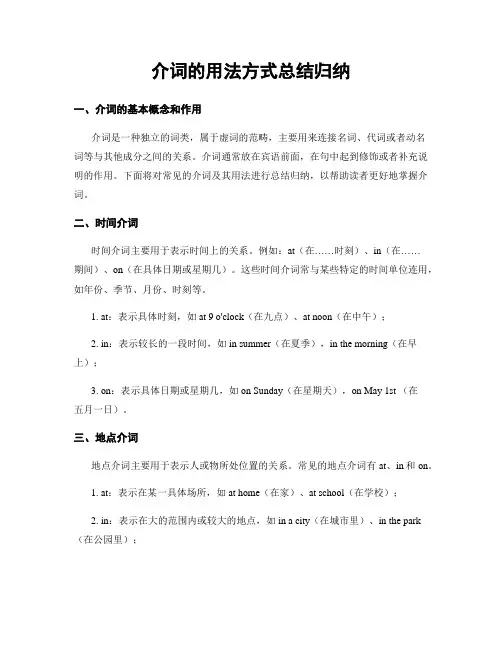
介词的用法方式总结归纳一、介词的基本概念和作用介词是一种独立的词类,属于虚词的范畴,主要用来连接名词、代词或者动名词等与其他成分之间的关系。
介词通常放在宾语前面,在句中起到修饰或者补充说明的作用。
下面将对常见的介词及其用法进行总结归纳,以帮助读者更好地掌握介词。
二、时间介词时间介词主要用于表示时间上的关系。
例如:at(在……时刻)、in(在……期间)、on(在具体日期或星期几)。
这些时间介词常与某些特定的时间单位连用,如年份、季节、月份、时刻等。
1. at:表示具体时刻,如at 9 o'clock(在九点)、at noon(在中午);2. in:表示较长的一段时间,如in summer(在夏季),in the morning(在早上);3. on:表示具体日期或星期几,如on Sunday(在星期天),on May 1st (在五月一日)。
三、地点介词地点介词主要用于表示人或物所处位置的关系。
常见的地点介词有at、in和on。
1. at:表示在某一具体场所,如at home(在家)、at school(在学校);2. in:表示在大的范围内或较大的地点,如in a city(在城市里)、in the park (在公园里);3. on:表示在物体表面或接触状态,如on the table(在桌子上)、on the wall (在墙上)。
四、方式介词方式介词主要用于表示行动或状态发生的方式。
常见的方式介词有by、with和in。
1. by:表示通过某种手段或方法,如by bus(乘坐公交车)、by phone(通过电话联系);2. with:表示使用某种工具或伴随着某个人或物,如write with a pen(用钢笔写字)、go shopping with friends (和朋友一起去购物);3. in:表示以某种方式进行,如send it in email (通过电子邮件发送)。
五、原因和目的介词原因和目的介词主要用于表示事物之间存在的原因关系或目的关系。

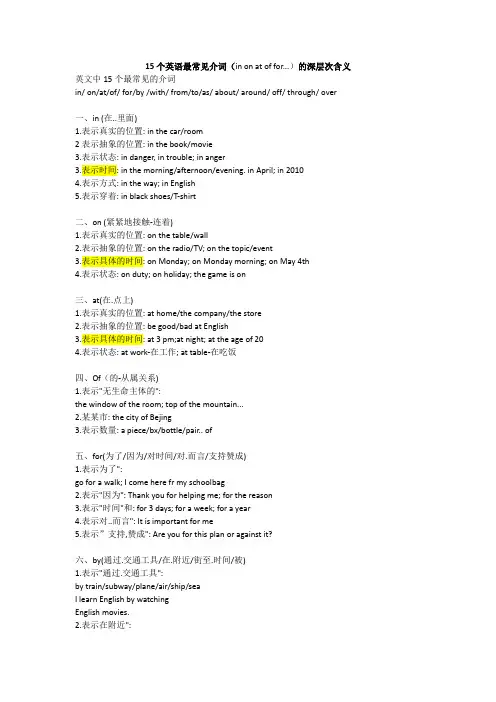
15个英语最常见介词(in on at of for...)的深层次含义英文中15个最常见的介词in/ on/at/of/ for/by /with/ from/to/as/ about/ around/ off/ through/ over一、in (在..里面)1.表示真实的位置: in the car/room2表示抽象的位置: in the book/movie3.表示状态: in danger, in trouble; in anger3.表示时间: in the morning/afternoon/evening. in April; in 20104.表示方式: in the way; in English5.表示穿着: in black shoes/T-shirt二、on (紧紧地接触-连着)1.表示真实的位置: on the table/wall2.表示抽象的位置: on the radio/TV; on the topic/event3.表示具体的时间: on Monday; on Monday morning; on May 4th4.表示状态: on duty; on holiday; the game is on三、at(在.点上)1.表示真实的位置: at home/the company/the store2.表示抽象的位置: be good/bad at English3.表示具体的时间: at 3 pm;at night; at the age of 204.表示状态: at work-在工作; at table-在吃饭四、Of(的-从属关系)1.表示"无生命主体的":the window of the room; top of the mountain...2.某某市: the city of Bejing3.表示数量: a piece/bx/bottle/pair.. of五、for(为了/因为/对时间/对.而言/支持赞成)1.表示为了":go for a walk; I come here fr my schoolbag2.表示"因为": Thank you for helping me; for the reason3.表示"时间"和: for 3 days; for a week; for a year4.表示对..而言": It is important for me5.表示”支持,赞成": Are you for this plan or against it?六、by(通过.交通工具/在.附近/街至.时间/被)1.表示"通过.交通工具":by train/subway/plane/air/ship/seaI learn English by watchingEnglish movies.2.表示在附近":a table by the window; the house is by the lake3.表示"截至到..时间":by the end of next week; by 20194.表示"被(被动语态)":English is spoken by people all over the world.七、with (伴随)1.表示"和.起":go with:play with;make friends with;cooperate with2.表示"携有,带有":a county with a long history; a house with a big garden3.表示..工具:cut the apple with the knife4.表示"伴随":with the development of the society;with the help of my teacher;I don't have any cash with me.八、from (远离)1.表示"来自":I am/come from China;a gift from my best friend;a man from America2.由"远离"来记短语:stop/prevent/keep sb from doing sth阻止某人做某事be away from...远离...be different from与.不同be absent from缺席....how far is it from here?它离这远The paper is made from wood.这纸是由木头制成的3.表示..到": from...to...由"指向"来理解下列用法:The road leads to Paris.这条路通往巴黎Smoking is harmful to your health.吸烟有害健康the answer to the question.这个问题的答案九、to (指向..)contribute to对..做贡献on one's way to... 在某人去某地的路上belong to属于..be used to doing sth习惯于做某事lead to...导致十、as作为He works as a tour guide.他作为导游工作。
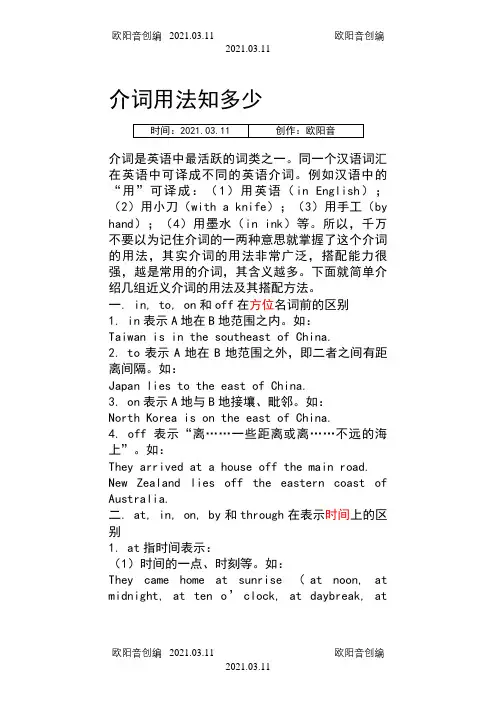
介词用法知多少介词是英语中最活跃的词类之一。
同一个汉语词汇在英语中可译成不同的英语介词。
例如汉语中的“用”可译成:(1)用英语(in English);(2)用小刀(with a knife);(3)用手工(by hand);(4)用墨水(in ink)等。
所以,千万不要以为记住介词的一两种意思就掌握了这个介词的用法,其实介词的用法非常广泛,搭配能力很强,越是常用的介词,其含义越多。
下面就简单介绍几组近义介词的用法及其搭配方法。
一. in, to, on和off在方位名词前的区别1. in表示A地在B地范围之内。
如:Taiwan is in the southeast of China.2. to表示A地在B地范围之外,即二者之间有距离间隔。
如:Japan lies to the east of China.3. on表示A地与B地接壤、毗邻。
如:North Korea is on the east of China.4. off表示“离……一些距离或离……不远的海上”。
如:They arrived at a house off the main road. New Zealand lies off the eastern coast of Australia.二. at, in, on, by和through在表示时间上的区别1. at指时间表示:(1)时间的一点、时刻等。
如:They came home at sunrise (at noon, at midnight, at ten o’clock, at daybreak, atdawn).(2)较短暂的一段时间。
可指某个节日或被认为是一年中标志大事的日子。
如:He went home at Christmas (at New Year, at the Spring Festival, at night).2. in指时间表示:(1)在某个较长的时间(如世纪、朝代、年、月、季节以及泛指的上午、下午或傍晚等)内。
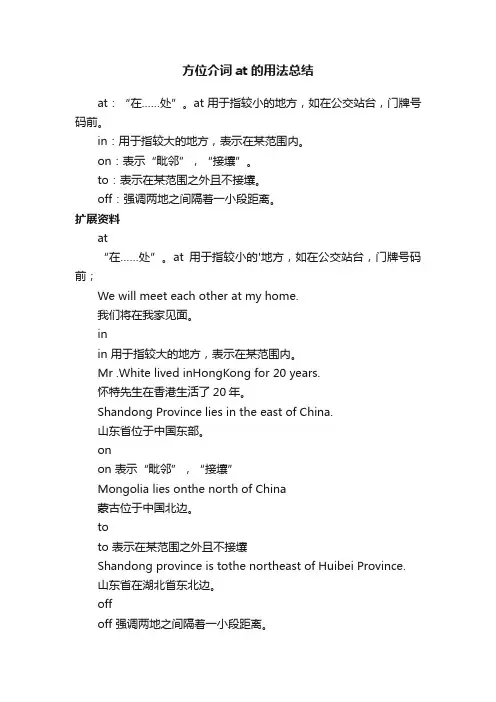
方位介词at的用法总结
at:“在……处”。
at用于指较小的地方,如在公交站台,门牌号码前。
in:用于指较大的地方,表示在某范围内。
on:表示“毗邻”,“接壤”。
to:表示在某范围之外且不接壤。
off:强调两地之间隔着一小段距离。
扩展资料
at
“在……处”。
at用于指较小的'地方,如在公交站台,门牌号码前;
We will meet each other at my home.
我们将在我家见面。
in
in 用于指较大的地方,表示在某范围内。
Mr .White lived inHongKong for 20 years.
怀特先生在香港生活了20年。
Shandong Province lies in the east of China.
山东省位于中国东部。
on
on 表示“毗邻”,“接壤”
Mongolia lies onthe north of China
蒙古位于中国北边。
to
to 表示在某范围之外且不接壤
Shandong province is tothe northeast of Huibei Province.
山东省在湖北省东北边。
off
off 强调两地之间隔着一小段距离。
Lily lives in a flat just off Park Avenue. 莉莉住在离派克大街不远的一套公寓里。
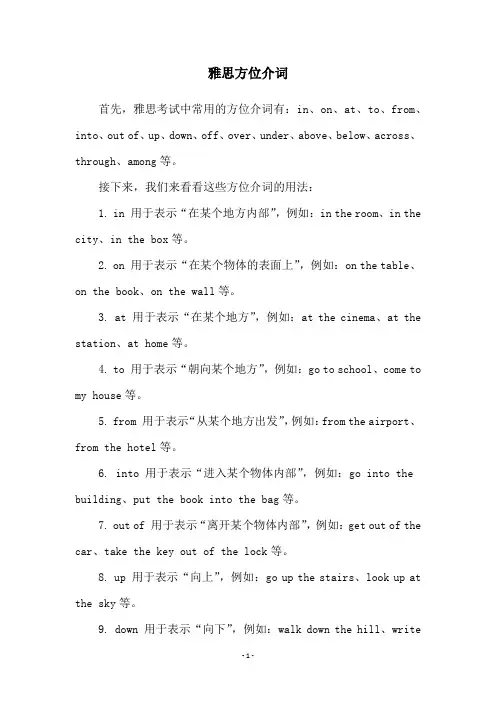
雅思方位介词首先,雅思考试中常用的方位介词有:in、on、at、to、from、into、out of、up、down、off、over、under、above、below、across、through、among等。
接下来,我们来看看这些方位介词的用法:1. in 用于表示“在某个地方内部”,例如:in the room、in the city、in the box等。
2. on 用于表示“在某个物体的表面上”,例如:on the table、on the book、on the wall等。
3. at 用于表示“在某个地方”,例如:at the cinema、at the station、at home等。
4. to 用于表示“朝向某个地方”,例如:go to school、come to my house等。
5. from 用于表示“从某个地方出发”,例如:from the airport、from the hotel等。
6. into 用于表示“进入某个物体内部”,例如:go into the building、put the book into the bag等。
7. out of 用于表示“离开某个物体内部”,例如:get out of the car、take the key out of the lock等。
8. up 用于表示“向上”,例如:go up the stairs、look up at the sky等。
9. down 用于表示“向下”,例如:walk down the hill、writedown the phone number等。
10. off 用于表示“离开某个物体表面”,例如:get off the bus、take the hat off等。
11. over 用于表示“在某个物体之上”,例如:fly over the city、put the blanket over the bed等。
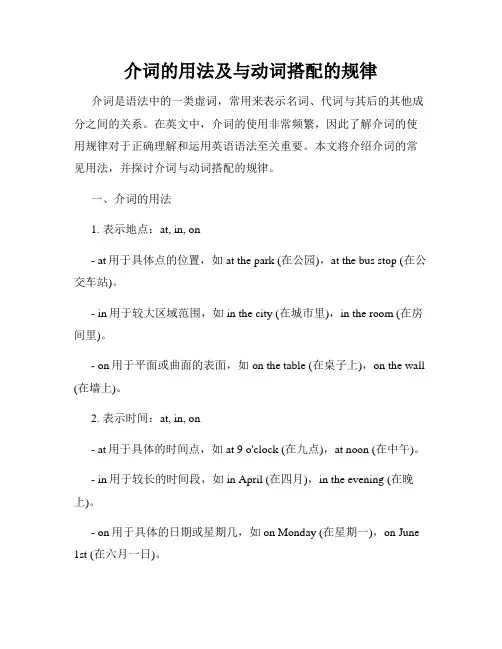
介词的用法及与动词搭配的规律介词是语法中的一类虚词,常用来表示名词、代词与其后的其他成分之间的关系。
在英文中,介词的使用非常频繁,因此了解介词的使用规律对于正确理解和运用英语语法至关重要。
本文将介绍介词的常见用法,并探讨介词与动词搭配的规律。
一、介词的用法1. 表示地点:at, in, on- at用于具体点的位置,如at the park (在公园),at the bus stop (在公交车站)。
- in用于较大区域范围,如in the city (在城市里),in the room (在房间里)。
- on用于平面或曲面的表面,如on the table (在桌子上),on the wall (在墙上)。
2. 表示时间:at, in, on- at用于具体的时间点,如at 9 o'clock (在九点),at noon (在中午)。
- in用于较长的时间段,如in April (在四月),in the evening (在晚上)。
- on用于具体的日期或星期几,如on Monday (在星期一),on June 1st (在六月一日)。
3. 表示方式:by, with- by表示通过某种工具或方法,如by car (乘坐汽车),by email (通过电子邮件)。
- with表示伴随的方式,如with a smile (带着微笑),with great enthusiasm (充满热情地)。
4. 表示原因:because of, due to- because of和due to都可以表示原因,但due to用于正式场合,后接名词或名词短语,而because of更常用,并且后接名词、代词或动名词短语。
5. 表示目的:for, to- for表示目标或目的,如study for the exam (为了考试而学习)。
- to表示动作的方向或目标,如go to school (去学校)。
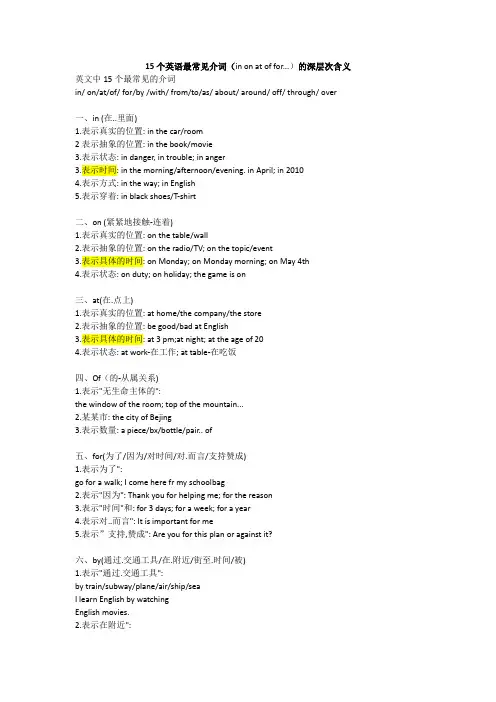
15个英语最常见介词(in on at of for...)的深层次含义英文中15个最常见的介词in/ on/at/of/ for/by /with/ from/to/as/ about/ around/ off/ through/ over一、in (在..里面)1.表示真实的位置: in the car/room2表示抽象的位置: in the book/movie3.表示状态: in danger, in trouble; in anger3.表示时间: in the morning/afternoon/evening. in April; in 20104.表示方式: in the way; in English5.表示穿着: in black shoes/T-shirt二、on (紧紧地接触-连着)1.表示真实的位置: on the table/wall2.表示抽象的位置: on the radio/TV; on the topic/event3.表示具体的时间: on Monday; on Monday morning; on May 4th4.表示状态: on duty; on holiday; the game is on三、at(在.点上)1.表示真实的位置: at home/the company/the store2.表示抽象的位置: be good/bad at English3.表示具体的时间: at 3 pm;at night; at the age of 204.表示状态: at work-在工作; at table-在吃饭四、Of(的-从属关系)1.表示"无生命主体的":the window of the room; top of the mountain...2.某某市: the city of Bejing3.表示数量: a piece/bx/bottle/pair.. of五、for(为了/因为/对时间/对.而言/支持赞成)1.表示为了":go for a walk; I come here fr my schoolbag2.表示"因为": Thank you for helping me; for the reason3.表示"时间"和: for 3 days; for a week; for a year4.表示对..而言": It is important for me5.表示”支持,赞成": Are you for this plan or against it?六、by(通过.交通工具/在.附近/街至.时间/被)1.表示"通过.交通工具":by train/subway/plane/air/ship/seaI learn English by watchingEnglish movies.2.表示在附近":a table by the window; the house is by the lake3.表示"截至到..时间":by the end of next week; by 20194.表示"被(被动语态)":English is spoken by people all over the world.七、with (伴随)1.表示"和.起":go with:play with;make friends with;cooperate with2.表示"携有,带有":a county with a long history; a house with a big garden3.表示..工具:cut the apple with the knife4.表示"伴随":with the development of the society;with the help of my teacher;I don't have any cash with me.八、from (远离)1.表示"来自":I am/come from China;a gift from my best friend;a man from America2.由"远离"来记短语:stop/prevent/keep sb from doing sth阻止某人做某事be away from...远离...be different from与.不同be absent from缺席....how far is it from here?它离这远The paper is made from wood.这纸是由木头制成的3.表示..到": from...to...由"指向"来理解下列用法:The road leads to Paris.这条路通往巴黎Smoking is harmful to your health.吸烟有害健康the answer to the question.这个问题的答案九、to (指向..)contribute to对..做贡献on one's way to... 在某人去某地的路上belong to属于..be used to doing sth习惯于做某事lead to...导致十、as作为He works as a tour guide.他作为导游工作。
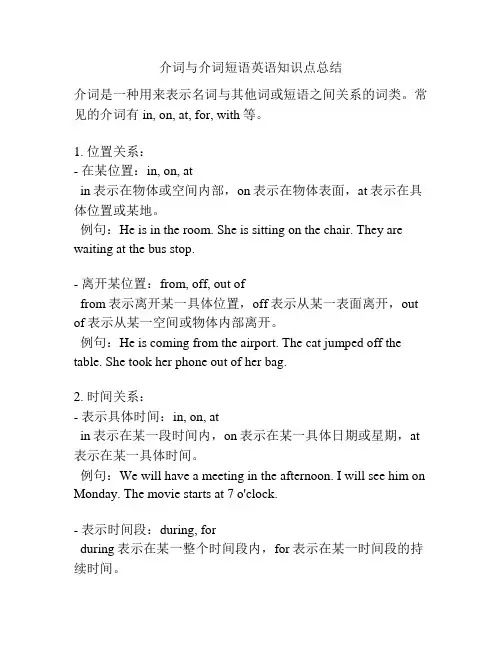
介词与介词短语英语知识点总结介词是一种用来表示名词与其他词或短语之间关系的词类。
常见的介词有in, on, at, for, with等。
1. 位置关系:- 在某位置:in, on, atin表示在物体或空间内部,on表示在物体表面,at表示在具体位置或某地。
例句:He is in the room. She is sitting on the chair. They are waiting at the bus stop.- 离开某位置:from, off, out offrom表示离开某一具体位置,off表示从某一表面离开,out of表示从某一空间或物体内部离开。
例句:He is coming from the airport. The cat jumped off the table. She took her phone out of her bag.2. 时间关系:- 表示具体时间:in, on, atin表示在某一段时间内,on表示在某一具体日期或星期,at 表示在某一具体时间。
例句:We will have a meeting in the afternoon. I will see him on Monday. The movie starts at 7 o'clock.- 表示时间段:during, forduring表示在某一整个时间段内,for表示在某一时间段的持续时间。
例句:He slept during the night. I will stay here for a week.3. 关系连接:- 表示原因:because of, due tobecause of表示由于,due to表示由于(正式用语)。
例句:He couldn't come because of the rain. The event was canceled due to bad weather.- 表示目的:for, tofor表示为了某一目的,to表示向某一目的地或对象。
介词用法介词是英语中最活跃的词类之一。
同一个汉语词汇在英语中可译成不同的英语介词。
例如汉语中的“用”可译成:(1)用英语(in English);(2)用小刀(with a knife);(3)用手工(by hand);(4)用墨水(in ink)等。
所以,千万不要以为记住介词的一两种意思就掌握了这个介词的用法,其实介词的用法非常广泛,搭配能力很强,越是常用的介词,其含义越多。
下面就简单介绍几组近义介词的用法及其搭配方法。
一. in, to, on和off在方位名词前的区别1. in表示A地在B地范围之内。
如:Taiwan is in the southeast of China.2. to表示A地在B地范围之外,即二者之间有距离间隔。
如:Japan lies to the east of China.3. on表示A地与B地接壤、毗邻。
如:North Korea is on the east of China.4. off表示“离……一些距离或离……不远的海上”。
如:They arrived at a house off the main road.New Zealand lies off the eastern coast of Australia.二. at, in, on, by和through在表示时间上的区别1. at指时间表示:(1)时间的一点、时刻等。
如:They came home at sunrise (at noon, at midnight, at ten o’clock, at daybreak, at dawn).(2)较短暂的一段时间。
可指某个节日或被认为是一年中标志大事的日子。
如:He went home at Christmas (at New Y ear, at the Spring Festival, at night).2. in指时间表示:(1)在某个较长的时间(如世纪、朝代、年、月、季节以及泛指的上午、下午或傍晚等)内。
介词用法:一. 表示方位的介词:in, to, on1. in 表示在某地范围之内。
2. to 表示在某地范围之外。
3. on 表示与某地相邻或接壤。
二. 表示计量的介词:at, for, by1. at表示“以……速度”“以……价格”。
2. for表示“用……交换,以……为代价”。
3. by表示“以……计”,后跟度量单位。
三. 表示材料的介词:of, from, in1. of成品仍可看出原料。
2. from成品已看不出原料。
3. in表示用某种材料或语言。
四. 表示工具或手段的介词:by, with, on1. by用某种方式,多用于交通。
2. with表示“用某种工具”。
3. on表示“以……方式”,多用于固定词组。
五. 表示关于的介词:of, about, on1. of仅是提到或谈到过某人或某事。
2. about指“关于”某人或某事物的较详细的情况。
3. on指“关于”学术性的或严肃的事。
六. 表原因或理由的介词for, at, from, of, with, by, because of 1. for表示原因,与sorry, famous, punish, praise, thank, blame连用。
2. at指情感变化的原因,意为“因听到或看到而……”。
3. from指“外在的原因”,如受伤、车祸等。
4. of指“内在的原因”,如病、饿等。
5. with指生理上或情感上的由外界到内心的原因。
6. by表示外部的,尤其是暴力的或无意中造成某种结果的原因。
7. because of 表示引起结果的直接原因。
8. owing to多表示引起某不良后果的原因。
9. thanks to表示引起某种幸运结果的原因,常译为“幸亏……,多亏……”。
10. out of表示动机的起因,常译为“出于……”。
11. through多表示因局部而影响全局的原因。
七. 表示好像或当作的介词:like, as1. like表示“像……一样”,其实不是。
介词的用法总结:一、表示时间的介词1 、at 、on 、in :——口诀“at 时间点,有on 必有天,in 指月季年”① at 用于某一具体时刻或重大节日之前② on 用在具体某一天或某天的上午、下午、晚上之前③ in 用在年、周、日、季节或泛指的上午、下午、晚上前2 、before 、afterbefore 表示“ 在某时刻或某件事之前” ,after 用在时刻或某件事之后。
3 、by 、till 、until① by 表示“ 在…… 之前,最迟到… 为止” 。
如:You must hand in your homework by nine o’clock. 你必须在9 点前交上家庭作业。
②till 与until 都有“ 直到……” 或“ 直到…… 为止” 之意。
till 多用于口语,且不能放在句首。
如:We waited till/until 10 o’clock last night. 昨晚我们一直等到10 点钟。
4 、since 、for① Since 和for 后接时间都可用于完成时,表示某一动作“ 延续了一段时间” 。
②而for 后跟“ 时间段” ,since 后接时间点,常与含延续性动词的完成时连用。
5 、in 、after①两者都有“ 在一段时间之后” 之意。
② “ in+ 时间段” 表示时间从现在算起,常用语将来时;I will finish the work in two hours. 两个小时后我将完成这项工作。
“ after+ 时间段/ 时间点” 表示的时间从过去算起,多用于过去时。
He returned his hometown after half an year. 半年后他返回了他的故乡。
6 、during 、through① during 意为“ 在一段时间内” 的行为或状态,与一段时间的整体连用。
I made many good friends during my visit to China. 我在中国参观期间交了很多好朋友。
英语中介词的意思及用法英语中介词是冠词、代词、数词、动词等做状语、定语、表语等作用时,连接他们的词语。
在英语中,介词绝大多数都有主语和宾语,表示主语和宾语之间的一种关系。
英语中介词分为常用介词和少用介词。
一、常用介词常用介词有in, on, at, from, to, with, for, of, in front of, behind, under, over, above, below, along, between, among, before, after, through, across, during, beside, by等。
1、inin表示“在...之内”的意思,表示物体的物理位置,或者表示状态,或者表示某一段时间之内。
例如:The book is in the classroom. 书在教室里。
She was in the hospital last week.上星期在医院里。
2、onon表示“在...上面”的意思,一般表示物体的物理位置,或者某处正在进行的活动。
例如:The book is on the table. 书在桌子上。
They are having a meeting on the fourth floor. 他们正在四楼开会。
3、atat表示“在...旁边”的意思,表示物体的物理位置。
例如:The girl is at the window.孩在窗户旁边。
4、fromfrom表示“从...起”的意思,表示某处的起始点。
例如:She comes from China.来自中国。
5、toto表示“至...终点”的意思,表示某处的终点。
例如:He is going to the station. 他正去车站。
6、withwith表示“和...一起”的意思,一般表示一起行动或一起出现的情况,也可以表示和某人有某种特定的关系。
例如:The children are playing with their teacher.子们和老师一起玩。
at,in,on的用法地点一、介词 "at" 用于地点:在英语中,介词 "at" 常用来表示具体的地点。
下面是几个常见的使用场景。
1. 学校或大学:学生们通常会说他们在某个学校上学。
比如:我在伦敦大学上学。
I study at the University of London. 这里,我们使用了介词 "at" 来指明具体的地点。
2. 银行或商店:当我们讨论银行、商店等特定地点时,也会使用介词 "at"。
例如:我经常在超市购物。
I often shop at the supermarket.3. 宴会或社交活动的场所:如果你接到一个邀请参加宴会或社交活动,你可能需要前往指定的场所。
比如:晚餐将在山景酒店举行。
The dinner will be held at Mountain View Hotel.4. 公共设施和建筑物:公共设施和建筑物通常是指图书馆、医院、公园等公共领域。
例如:我每天都要去图书馆看书。
I go to the library every day to read.5. 户外活动地点:进行户外活动时,也可以使用介词 "at" 来描述地点。
例如:我们周末会在海滩上野餐。
We have picnics at the beach on weekends.二、介词 "in" 用于地点:介词 "in" 也是常用来表示地点的介词。
下面是几个常见的使用场景。
1. 城市或国家:当我们想要表达某人在特定的城市或国家时,可以使用介词 "in"。
例如:我住在纽约。
I live in New York.2. 房屋内部:如果我们想要描述某物或某人在房屋内部的位置,同样可以使用介词 "in"。
例如:我妈妈正在厨房里做饭。
My mother is cooking in the kitchen.3. 大区域范围:当我们谈论大范围的地理位置、行政区域或其他区域时,使用介词 "in" 是常见方式。
to的用法:一:表示相对,针对be strange (common, new, familiar, peculiar, distinct, sensitive, immune, vulnerable, indispensable) toAir is indispensable to life.Aircrafts are vulnerable to interference caused by radiation.This injection will make you immune to infection.二:表示对比,比较1:以-ior结尾的形容词,后接介词to表示比较,如:superior ,inferior,prior,senior,junior The quarrel happened prior to my arrival.2: 一些本身就含有比较或比拟意思的形容词,如equal,similar,equivalent,analogous A is similar to B in many ways.3:表示一些先后顺序的形容词,如:second,subsequent,next,preliminary,preparatory Subsequent to the war,they returned to their hometown.4: to也偶尔出现在个别动词之后,与动词形成固定词组,表示比较,如:prefer to,compare to,in contrast tocompare to sth.表示比喻或比拟,而compare with sth.表示比较,如:World is usually compared to a stageCompared with his past,he has changed a lot.Prefer的正确句型是:prefer A to B或prefer doing A to doing B,但当prefer后接动词不定式时,表示比较的介词to就要改成rather than ,如:The undaunted soldier preferred death to surrender.Many people prefer spending money to earning money.They prefer to pursue careers rather than remain home as house wives.5: to与及个别的名词构成比较之意,如:alternativeGoing to an under water concert is a great alternative to going to dinner.三: 表示修饰关系1: 表示回复,反应意思的词,如:answer to question,solution to problem,response to inquiry,reaction to proposal,reply to letter2: 表示建筑构件的词汇,如: entry,entrance,approach,access,passage,exit,vent,paththe approach to a bridge引桥the approach to scienceHalf of the population was estimated to have no access to the health service.The access to education 接受教育的机会The access to medical care 享受公费医疗的权利3: 表示人物职位和官衔的词,如:assistant to manager, ambassador to Spain, successor to tradition, heir tothrone,deputy to the National People’s Congressadvisor to the Prime Minister4: 表示权利和许可的词汇,如:right,admissionThe employee finally got the admission to the boardroom.Everyone has an equal right to ……..5: 表示栅栏或障碍的词汇,如:bars to development,the barrier to progress6: 表示与书籍,文本相关的词,如:introduction to passage.7: 表示恭喜或是祝贺,如:The director proposed a toast to the health of the guests.Let’s drink to Dick’s success in business8: 另外还有一些名词符合这种用法,有的具有两者息息相关,缺一不可的含义.如:key to door,invitation toparty,guide to action,limitation to life,accessory to school四: to还具有依据,伴随,和着节奏的含义,如:sing to piano, chance to the tune, stamp to the rhythm of the song, add salt to taste(一):表示相关联,相连接,如:be related to,be relative to,in relation to,be relevant to,link toInvestigate all the facts related to the problem.People often linked walth to happiness.(二):表示反对和赞同。
1:to引导的表示反对,抗拒,对抗意义的词组。
Be opposed to,be oppsist to,be contrary to,be adverse to,beresistant to,be contradictory to,object to,oppose to,deny tp,be aline toThese buildings are resistant to earthquake.They are to tally opposed to any changes being made in the plans.2: to引导的表示同意,赞同意义的词组:consent to,subseribe to,The employer consented to give him a salary raise.表示调整,使符合,使适应的含义,如:adapt to,commodate to, adjust to,conformto,habituate to,fit to,suitto,correspond to,cater toShe tried to habituate herself to the style of plain living.Your action should conform to the interests of the people.They offered various foods to cater to the need of customers.His words doesn’t fit to his actions.Suit your writing style to the masses.3: 表示投降,屈服,服从的含义,如:be subject to,be subordinate to,submit to,subjectto,surrender to,give into,confess to,admit to.The minority is subordinate to the majority少数服从多数Countries nearby oceans are always subject to earthquake.He confessed to having robbed the woman of her wallet.We’re not the kind of people to yield to any military threat.五: 表示趋势或倾向,如:tend to,be prone to,be inclined to,be apt to,be liable to He’s liable to seasickness.You are liable to come to wrong conclusion.六: 表示对事情的坚持与执着,如:sick to,hold o,adhere to,cling toHe still holds on to his original views.七: 表示约束,局限,如:limit to,confine to,resrict toHe’s confined to the house by illness.He confined his remarks to scientific mangement.八: 表示一种习惯或是一种适应性,如:get (be) to,used to,be accustomed to Finally,the students got used to my teaching method.九: 表示起因和原由,如:owing to,due to,thanks to,attribute to,come down to The flight was cancelled due to the thick fog.The famous artist attributed his success to his wife.十: 表示目的或结果,如:aim to,lead to,give rise toI aim to be an excellent college teacher.His conceit lead to his failure.These bad condition has given rise to a lot of crises十一: 表示命运,注定,如:be doomed to,be destined to,All military adventures by the two super powers are doomed to fail.十二: 表示数量上的积累或增加,如:in addition to,add to,amount toIn addition to relief supplies,he also presented with some money.The annual output of steel amounts to 1200 tons.十三: 表示全身心投入的含义,如:be addicted to,contribute to,devote to,commit toHe is determined to devote all his life to his.十四: 表示展望或是回顾,如:look forward to反date back toThe church dates back to the 13th century.十五: 表示方位概念.如:close to,next toI don’t like wool next to my skin.十六: 表示依靠或借助,如:resort to,turn to,appeal to,He usually appeals to arms to settle the territory dispute.十七: 表示有关注,关于: as to,with regard to十八: 表示关注或重视,如:pay attention to,attach to,We should attach primary importance to job training.十九: 表示依据或是根据,如:according to,in proportion toAccording to today’s newspaper,the match will be postponed.The lending countries subscribe towards capital stock in proportion to heir economic importance.二十: 表示应该或必须含义的句式, 如:It’s time to get up.We are supposed to get here at seven.It’s up to this country to ban nuclear weapons.常用词组respond to(反应), appeal to(吸引), catch on to(理解), listen to (收听),used to (过去常常), give birth to,attend to(照料), see to(负责), be entitled to(有权), belong to(属于), come to(苏醒), stand up to(勇敢面对), help oneself to(请自便), refer to,to the point(切题),Train them to stand up to any severe test in hard.The ticket entitled you to a free meal in the luxury hotel.See to it that the children get a hot meal after their swim.You will catch on to the job shortly after wards.People usually refer to television for up-to-the-minute news.介词的用法:上午、晚要用in,at黎明、午夜、点与分。